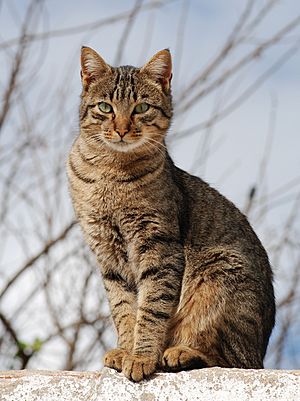
Cats have been tamed by humans for almost 10,000 years. Some domestic cats live on farms to help catch rodents. These are called farm cats. Cats that live away from humans are called Feral cats. Cats are one of the most popular pets in the world. People keep them for hunting rodents and for companionship. There are about 60 different breeds of domestic cats. Some have short hair, some have long hair, and some have no hair at all! Cats that are not specific breeds are often called 'domestic shorthair' (DSH) or 'domestic longhair' (DLH).
A baby cat is called a kitten. People sometimes call cats kitty or pussycat. A female cat that can have kittens is called a queen. A male cat that can father kittens is called a tom.
The word cat can also mean other felines. Felines are usually known as either big cats or small cats. The big, wild cats are famous: lions, tigers, leopards, jaguars, pumas, and cheetahs. There are also small, wild cats in most parts of the world. Examples include the lynx in northern Europe and the bobcat in North America. Wild cats, no matter their size, are not tame and can be very dangerous.
Cat History
Long ago, especially in Egypt, people kept domestic cats. They were useful because they hunted and ate mice and rats. The oldest proof of cats kept as pets comes from the Mediterranean island of Cyprus. This was around 7500 BC. Ancient Egyptians even thought cats were gods. They often mummified them. This was so the cats could be with their owners "forever."
Cat Behavior
Cats are active carnivores. This means that in the wild, they hunt live prey. Cats are super fast, but only for short distances. Their main prey is small mammals, like mice. They will also sneak up on, and sometimes catch and eat, birds. Cats eat many different kinds of prey. This includes insects like flies and grasshoppers. Their main way of hunting is to stalk and pounce. The basic cat fur color, tabby (like the cat this photo), helps them hide well in grass and woodland. This is a kind of camouflage. The cat creeps towards its chosen victim. It keeps its body low to the ground so it's hard to see. It waits until it's close enough for a quick dash or pounce. Cats, especially kittens, practice these natural behaviors when they play with each other or with small toys.
Cats can even fish! They use a quick flip of a front paw. If they are successful, they flip the fish out of the water. It lands over the cat's shoulders onto the grass. Research from the Netherlands showed this is a natural behavior. Cats do it without being taught.
Cats are quiet and well-behaved animals. This makes them popular pets. Young kittens love to play. They can easily entertain themselves with toys from a store or made at home. House cats have even learned to open lever-style doorknobs and use toilet handles. You can train cats, but there's a limit. They can be as smart as dogs, but they don't live in packs. Cats are quite independent animals. They can take care of themselves. They don't need or want as much attention as dogs do.
Cat Superstitions
Many cultures have old beliefs about cats that are not true. For example, some people believe that a black cat crossing your path brings bad luck. Others thought cats were companions to witches. They believed cats helped witches become more powerful. There's a myth in many cultures that cats have multiple lives. In many countries, people believe they have nine lives. But in Italy, Germany, Greece, Brazil, and some Spanish-speaking places, they are said to have seven lives. In Arabic traditions, the number of lives is six.
Fun Facts About Cats
- Cats purr at a certain sound frequency. This frequency is between 25 and 150 Hertz. This is the same frequency that helps bones and muscles grow and repair themselves.
- Cats sweat through their paws. Since they are covered in fur, their paws are one of the few places they can sweat. Most of their sweat glands are on their paws.
- A cat's ears are controlled by more than 20 muscles.
- The nose ridge of a cat is as unique as human fingerprints.
- Cats can filter the salt out of seawater. This means they won't get dehydrated if they drink it, unlike humans.
- Cats (like dogs) eat grass to make themselves vomit. This helps them get rid of hairballs naturally.
- Cats can't taste anything sweet.
- A group of cats is called a clowder. A group of kittens is called a kindle.
- The love of cats is called Ailurophilia.
To read the full article on Kiddle, please click here.




